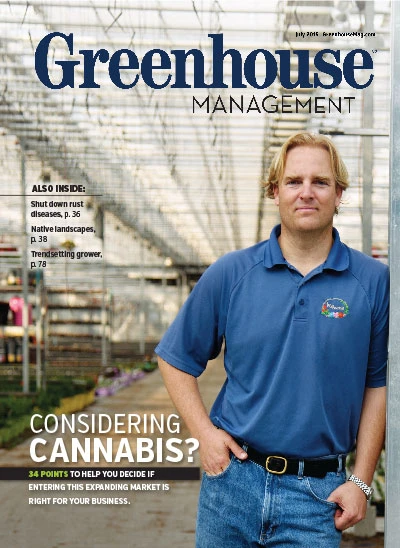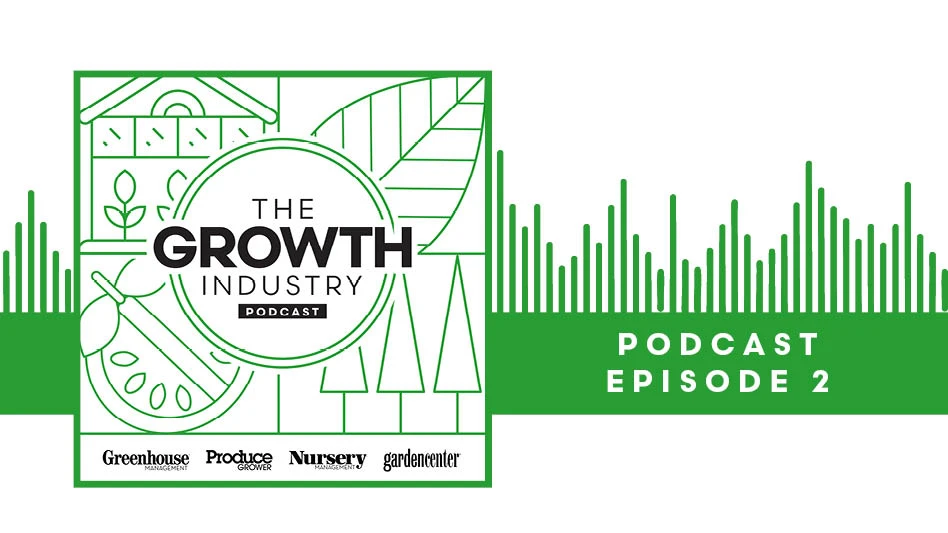
 Alex Traven has been leading the charge to ensure Peace Tree Farm does a better job of connecting with millennials. He has a passion for food, and he knows many of his fellow millennials want their plants to be more than ornamental. To that end, he’s been working to add more edibles to the company’s production. He’s also been instrumental in administering the farm’s impressive biocontrol program.
Alex Traven has been leading the charge to ensure Peace Tree Farm does a better job of connecting with millennials. He has a passion for food, and he knows many of his fellow millennials want their plants to be more than ornamental. To that end, he’s been working to add more edibles to the company’s production. He’s also been instrumental in administering the farm’s impressive biocontrol program.
Traven, 25, is the son of Lloyd and Candy Traven, the horticulturists who purchased the Bucks County property that would become Peace Tree Farm in 1983. His first childhood memories of the greenhouse involve placing tags in pots, under the auspicious parental ruse that the tags were vital to plant growth. Not a bad way to keep a five-year-old busy for a few hours. He started actively growing plants in high school, and although he’s been involved in the family business since childhood, he was determined to forge his own path in the industry.
After graduating from Cornell University with a degree in plant science, Traven did not jump right back into the family business. At Cornell, Traven was the manager of the student-run organic farm Dilmun Hill, where he and a team of students grew and supplied produce to Cornell's dining establishments and the local community and restaurants. After graduation, Traven worked on a field-grown cut flower farm in Newfield, N.Y. and a vegetable farm in Tilamook, Ore. Tom DeNoble, owner of DeNoble’s Farm Fresh Produce, taught Traven much about the economics of growing and selling high-end produce.
Green growing
Now, Traven is applying what he learned at those two very different growing facilities at the very greenhouse he grew up in. Traven returned to Peace Tree Farm in 2014, and became the head grower and manager of the greenhouse’s biocontrol program.
 Peace Tree Farm is almost entirely biocontrol-based in all its facilities, but especially in its Certified Organic greenhouse. The company started using beneficial insects in 2005, Traven says, and it’s baked into the farm’s identity now. The Kintnersville, Pa.-based grower has cut its pesticide and chemical use to almost nothing.
Peace Tree Farm is almost entirely biocontrol-based in all its facilities, but especially in its Certified Organic greenhouse. The company started using beneficial insects in 2005, Traven says, and it’s baked into the farm’s identity now. The Kintnersville, Pa.-based grower has cut its pesticide and chemical use to almost nothing.
“We really focus on both a prophylactic type of care and really trying to create an ecosystem,” Traven says. “And the amount of interrelationships between different beneficial insects, different prey, diseases and the thousands of species that we grow is really, really complicated and a lot to wrap your head around.”
It’s certainly been a learning process for Traven, but he’s developed a system that has shown results. It requires re-education for employees and consumers alike, because the biocontrol system is very different than the pest control methods they know well.
Most growers and gardeners are taught that if you see something moving you should spray it and kill it. Things are different at Peace Tree Farm. Traven says his crew tries to tolerate very low-level infections, because they use many beneficial parasites and parasitoids which use those pest insects as their hosts. “Often, you’ll find a plant with a few aphids or a few white flies on it, but a lot of times, they’re already parasitized so that can be confusing for people,” Traven says.
The biocontrols program is one way Peace Tree Farm is striving to be more environmentally responsible. Another is the greenhouse’s ebb and flood irrigation system. Traven says the greenhouse reclaims almost all of its irrigation water — fertilizer and nutrients and all. In addition, Peace Tree Farm installed a state-of-the-art water purification system last year that ensures the farm’s runoff has a low impact on the environment.
Give the millennials what they want
Traven loves growing plants that can be food, and he’s been working to drive Peace Tree Farm toward more edible ornamentals. Whether it is colorful kale varieties or red vein sorrel, he has a fondness for plants “that can just as easily go in a container pot or be dinner.” Herbs have always been a big part of Peace Tree’s production, and since the greenhouse received its organic certification it added several vegetable starter plants. But Traven wants to take advantage of the untapped millennial market — and those budding gardeners want plants that are more than just eye candy.
It makes production sense, too, because the greenhouse has extra space in the fall and early winter. Traven wants to use that space to create something of value that is in high demand right now.
Connecting with younger consumers is a prime focus for many growers, and Traven hopes the horticulture industry makes strides toward that goal. Paying attention to the edible trend would be a good start, as well as a way to stay relevant with a new generation.
“It seems like an industry that has fallen quite out of touch with the new customer base, which is mostly younger people, and it seems like it’s very much trying to hold onto an old customer base that no matter what is going to slip away,” Traven says. “And it really seems reluctant to follow-up on new trends and give people the types of things that they’re looking for.”
Traven would like to see the green industry improve how it connects people to plants and nature. He believes potential is there, but the industry has lost sight of that connection.
“I feel like [horticulture] somehow exists in this very strange bubble that doesn’t really foster a connection to place,” he says. “It’s just like if you look at petunias outside of somebody’s house, like a decoration that you put somewhere and don’t really think about; whereas a lot of young people are really starting to develop these emotional attachments to plants and treating them a little bit more like pets in a way, and having stories behind plants.”
Matt McClellan is managing editor for sister publication Nursery Management.

Explore the July 2015 Issue
Check out more from this issue and find your next story to read.
Latest from Greenhouse Management
- Trends: Proven Winners 2025 perennial survey shows strong demand
- Online registration opens for the 2025 Farwest Show
- Sustainabloom launches Wholesale Nickel Program to support floriculture sustainability
- Be the source
- pH Helpers
- Society of American Florists accepting entries for 2025 Marketer of the Year Contest
- American Horticultural Society welcomes five new board members
- Color Orchids acquires Floricultura Pacific, becoming largest orchid supplier in U.S.






